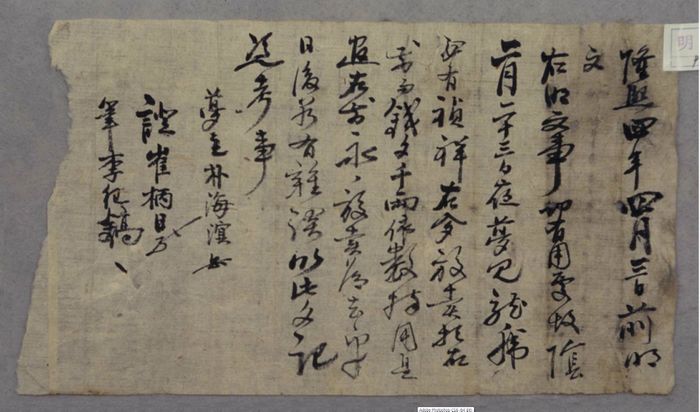"(Translation) 1910年 朴海溟 賣夢明文"의 두 판 사이의 차이
| 60번째 줄: | 60번째 줄: | ||
=='''Further Readings'''== | =='''Further Readings'''== | ||
| − | + | ||
<div style="color:#008080;"> | <div style="color:#008080;"> | ||
* View together with '''[[Record of Property Distribution among Brothers from 1621]]'''. | * View together with '''[[Record of Property Distribution among Brothers from 1621]]'''. | ||
</div> | </div> | ||
| − | + | ||
* | * | ||
* | * | ||
| 167번째 줄: | 167번째 줄: | ||
=='''Further Readings'''== | =='''Further Readings'''== | ||
| − | + | <div style="color:#008080;"> | |
* View together with '''[http://kadhlab103.com/wiki/index.php/어제경민음 (Korean text) King Yeongjo’s Admonition for the People” (Eoje gyeongmineum 御製警民音, 1762)]''' | * View together with '''[http://kadhlab103.com/wiki/index.php/어제경민음 (Korean text) King Yeongjo’s Admonition for the People” (Eoje gyeongmineum 御製警民音, 1762)]''' | ||
| − | </div | + | </div> |
--> | --> | ||
2022년 2월 14일 (월) 20:48 판
| Primary Source | ||
|---|---|---|
 |
Title | |
| English | A Document of Selling a Dream | |
| Chinese | 1910年 朴海溟 賣夢明文 | |
| Korean(RR) | 1910년 박해명 매몽명문(Pak Haemyŏng Maemongmyeongmun) | |
| Text Details | ||
| Genre | Social Life and Economic Strategies | |
| Type | Record | |
| Author(s) | 朴海溟 | |
| Year | 1910 | |
| Source | ||
| Key Concepts | Trading | |
| Translation Info | ||
| Translator(s) | Participants of 2017 Summer Hanmun Workshop (Advanced Translation Group) | |
| Editor(s) | Jong Woo Park | |
| Year | 2017 | |
==Introduction (Irina) In Korea since ancient times omens has played an important role. Often significant state decisions or family affairs have been resolved by the emergence of divine signs that have been interpreted by a professional fortune teller. One of these signs is the dream. Every great event is thought to be preceded by an auspicious dream. In folk culture the dreams of conception, which precede the birth of a son, are particularly important. Until recently in Korea, the main role and task of the woman was to give birth to a son who would continue the lineage. Respectively the inability of a woman to give birth to a son was the main cause of anxiety. So, a number of superstitions were practiced to help conceiving a son, including buying an auspicious conception dream. Usually the woman or her husband buys the dream of someone who has dreamed an auspicious conception dream, most often a dragon or a tiger. Dreaming a dragon or tiger precedes the conception of a great and heroic son. It is considered that the “deal” is valid only if the buyer pays with money or some object.
We can trace the tradition of buying and selling dreams back in time, when the story of the Munhui, sister of the great commander Kim Yu-shin (595 – 673), was recorded. Munhui buys her sister's dream and thanks to it she marries the future ruler King Taejong Muyeol ((604 – 661) and gives birth to a great son. In return she pays with silk skirt (Samguk Yusa, Book 1, Taejong Kim Ch’un-ch’u).
Original Script
| Classical Chinese | English |
|---|---|
|
隆熙四年四月三日前明文 右明文事 切有用處故 陰 二月二十三日夜夢見龍虎 必有禎祥 右夢放賣於右 前 而錢文千兩依數捧用是 遣 右前永永放賣爲去乎 日後若有雜談 以此文記 憑考事 夢主朴海溟 證崔柄日 筆李紀鎬 |
First Part (by Jong Woo): The fourth year of Yunghi (1910), fourth month, third day. This document has the following usage. The twenty-third day of the second month of the lunar calendar, I saw in my dream a dragon and a tiger. This [dream] should be auspicious. Middle Part (by Kim Young): I sell this dream to this person and receive a thousand 錢文... ;P |